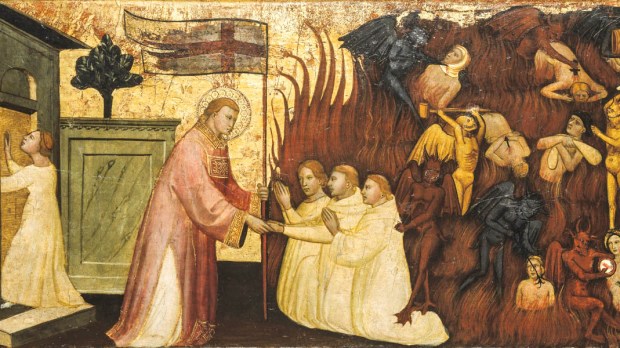In her official teaching, the Church doesn’t say much about what Purgatory is actually like, but from the writings of saints and theologians, there’s much we can learn.
1- It’s a place of intense suffering and joy. St. Catherine of Genoa, who is said to have suffered the pain of purgatory on earth, claimed “there is in purgatory as much pain as in hell” (Treatise on Purgatory). Like the damned, souls there suffer hunger for the God they don’t yet see—like a man who could live without eating, hungering more and more for the bread he doesn’t have (to use St. Catherine’s image). And they suffer from fire that “will be more painful than anything man can suffer in the present life” (St. Augustine, On Psalm 37:3).
Once St. Catherine of Ricci is said to have suffered 40 days for a soul in Purgatory—when a novice touched her hand, she remarked, “Mother, you are burning!”
At the same time, St. Catherine of Genoa also taught, “Souls in purgatory unite great joy with great suffering … No peace is comparable to that of the souls in purgatory, except that of the saints in heaven.”
There’s a mysterious ebb and flow of pain and joy in Purgatory, says the Dominican Fr. Reginald Garrigou-Lagrange, because the suffering is temporary and leads to heaven: The more the soul loves God, the more it suffers not seeing Him; the more if suffers, the more joy and love it has in drawing closer to God.
2- It’s a place of cleansing and mercy. Remember the parable about the man who came to the king’s marriage feast without a wedding garment? (Matthew 22:1-14) The wedding garment is the life of grace we need to enter the feast of heaven. Now imagine a twist: The man comes wearing his garment, but it’s all soiled. What would the king say? Maybe something like: “Nothing unclean shall enter” (Revelation 21:27).
In the Old Testament, Judas Maccabeus had his men pray for the deceased and requested that a sin offering be made for them: “Therefore he made atonement for the dead, that they might be delivered from their sin.” (2 Maccabees 12:43) This presupposes a place of purification after death—Purgatory.
Many Church Fathers think St. Paul alluded to Purgatory when he wrote about building on the foundation of Jesus with gold or silver, wood or straw: “The fire will test what sort of work each one has done … If any man’s work is burned up, he will suffer loss, though he himself will be saved, but only as through fire” (1 Corinthians 3:13, 15). Wood and straw didn’t fare well for the three pigs—but God, in His mercy, doesn’t demand gold!
That’s a good thing, because Fr. Garrigou-Lagrange says, “Souls that completely escape all purgatory are probably rather rare. Among the good religious whom St. Teresa knew, only three had completed their purgatory on earth” (Life Everlasting., p. 194).

Read more:
Benedict XVI’s teaching on purgatory
3- It’s a place to avoid. Nevertheless, it can be avoided, and the saints have repeatedly encouraged us to make our Purgatory on earth.
Fr. Paul O’Sullivan gives the following advice for avoiding Purgatory (How to Avoid Purgatory):
- avoid sin
- do penance
- accept suffering
- frequent confession and Communion
- pray with faith and perseverance
- prepare for death: “Eternal Father, from this day forward, I accept with a joyful and resigned heart the death it will please You to send me, with all its pains and sufferings.”
- gain indulgences
It’s advice that makes saints … even in this life. As Fr. Garrigou-Lagrange reminds us: Attaining sanctity on earth is possible—and normal—for everyone.

Read more:
Pope Francis: ‘Do Not Be Afraid of Holiness’

